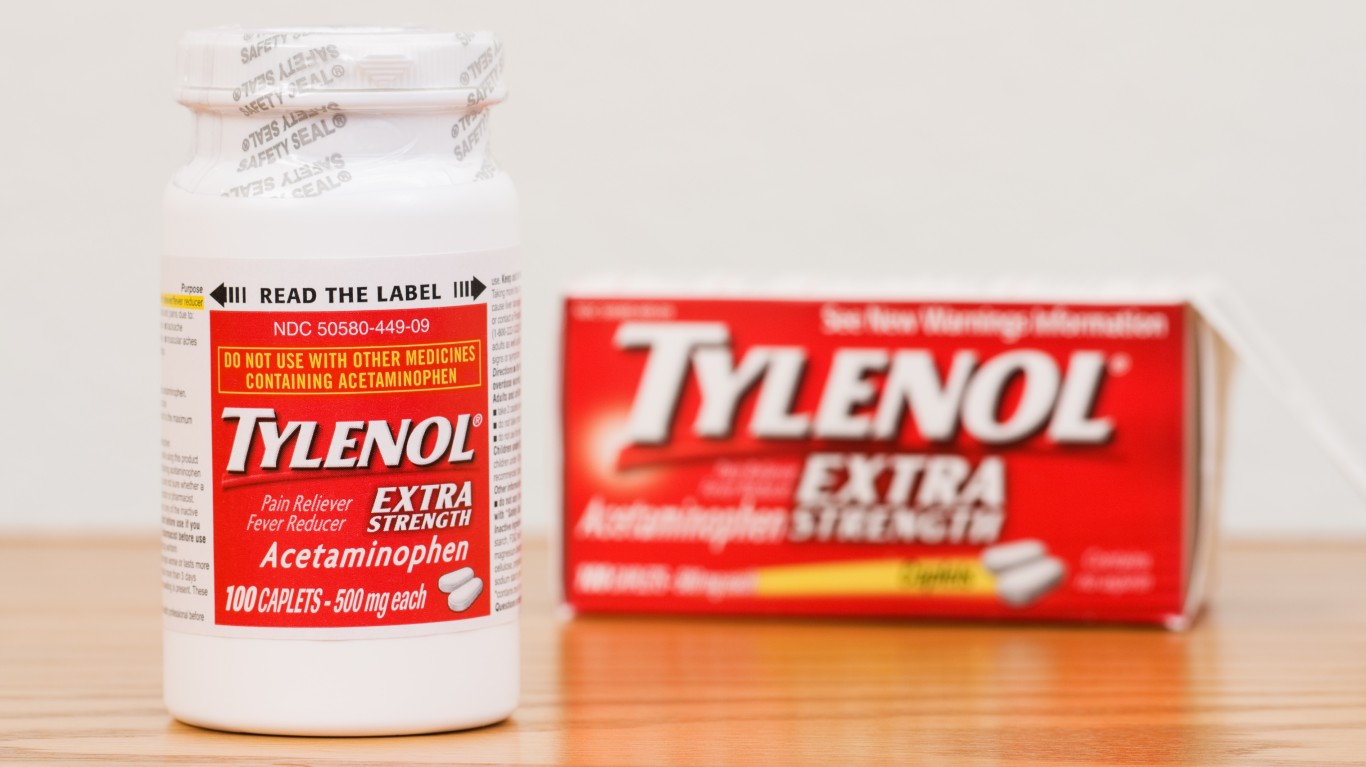Health and Healthcare
It's Easy to Overdose on Acetaminophen and It Can Kill You, New Study Says

Published:
Last Updated:

A popular pain-killer, generally considered safe and effective, can turn toxic and even deadly if it’s overused — a concern amplified by a study of the possible deadly effects of the drug published earlier this week in the Medical Journal of Australia.
Acetaminophen, an analgesic (a compound that relieves pain), is the most common drug ingredient in America. Many know it as the active ingredient in Tylenol, but it is also present in Anacin, Benadryl, Contac, Dristan, Excedrin, Midol, Nyquil, Robitussin, Sudafed, and many other over-the-counter remedies, as well as in such prescription medicines as Percocet and Vicodin. Brand-name Tylenol and Tylenol PM alone racked up almost $388 million in U.S. sales last year.
While it is often favored because it doesn’t cause the stomach or heart problems that sometimes result from the use of another class of analgesics, nonsteroidal anti-inflammatory drugs (NSAIDs), acetaminophen — known as paracetamol outside of the United States — it has long been recognized that it can cause liver damage, especially if used in conjunction with alcoholic beverages.
Interactions with alcohol and other substances can make many otherwise beneficial medications unsafe, even deadly. These are the 25 most dangerous drugs.
The Australian study notes that there has been a noticeable increase in cases of paracetamol (acetaminophen) poisoning, at least in Australia, over the past decade. In fact, it is the number-one pharmaceutical that Australian poison centers receive calls about — and between 2007 and 2017, it was responsible for more than 95,000 hospitalizations in the country. More than 200 cases of paracetamol poisoning during that period were fatal. In other cases, a liver transplant was required.
The problem isn’t that acetaminophen is dangerous in itself, but that in large amounts it outpaces the body’s ability to process it safely. According to one of the study’s authors, Dr. Rose Cairns, a lecturer at the University of Sydney’s School of Pharmacy, “This can lead to build up of a toxic metabolite (or break-down product), which binds to liver cells, causing these cells to die.”
The manufacturers of Tylenol recently lowered the maximum recommended daily dose for single-ingredient Extra Strength Tylenol from eight pills per day (4,000 mg) to six pills per day (3,000 mg). Tylenol is made by Johnson & Johnson, which recently faced lawsuits over its talc and asbestos woes.
The margin of error is slim with the drug. An adult taking more than 4,000 mg of Tylenol a day could be at risk, said Cairns.
She reported that about three-quarters of the overdose cases she and her colleagues studied were intentional, in people using it for self-harm. As for the rest, Cairns added, “People might accidentally overdose because they are in pain, and believe because paracetamol is so widely available, it must be safe…or take multiple different paracetamol-containing products together.”
The study points out that the U.K. limits the amount of paracetamol a customer can purchase and than many European countries sell it only by prescription. This is one way to control how much people take, but there is no guarantee. For example, the world’s most popular prescription drug might be killing people.
Are you ahead, or behind on retirement? For families with more than $500,000 saved for retirement, finding a financial advisor who puts your interest first can be the difference, and today it’s easier than ever. SmartAsset’s free tool matches you with up to three fiduciary financial advisors who serve your area in minutes. Each advisor has been carefully vetted and must act in your best interests. Start your search now.
If you’ve saved and built a substantial nest egg for you and your family, don’t delay; get started right here and help your retirement dreams become a retirement reality.
Thank you for reading! Have some feedback for us?
Contact the 24/7 Wall St. editorial team.